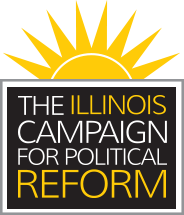 On April 14th, Karl Fogel of Open Tech Strategies and QuestionCopyright.org presented at OpenGov Hack Night on data rebroadcasting and server-side responsibility.
On April 14th, Karl Fogel of Open Tech Strategies and QuestionCopyright.org presented at OpenGov Hack Night on data rebroadcasting and server-side responsibility.
Data rebroadcasting is when one datasource posts data from another source. Civic apps tend to do this all of the time. For example, clearstreets.org rebroadcasts data from the City of Chicago’s plow tracker website and chicagoflushots.org rebroadcasts data from the city data portal.
Fogel used several examples to showcase the problems that can occur when people rebroadcast data that may invade someone’s privacy or may be downright inaccurate. The first example was Chicago Councilmatic. A resident’s name had been placed on the record after filing a dispute about a very high water charge. The resident had asked that her name be removed from the site. However, this proved difficult since the app scrapes the Chicago City Clerks’ Legistar Website and is part of the official public record. Whatever’s in the public records ends up being placed on the Councilmatic website.
Another example that Fogel used to talk about the problem of data rebroadcasting is expungement. Whenever you get your criminal record expunged, the law considers reality as you having never committed the crime in the first place. So, when you’re applying for the a job and they ask “Have you ever been convicted of a crime?” you can answer no and be legally correct.
However, if you start googling sometimes you’ll find the information about your criminal record still exists on the internet. Most infamously, there are sites that make money by posting mugshots online and charging for their removal. Additionally, news sites about the case may still come up as a top hit in a google search. Fogel used one news site as an example where the news site posted an updated disclaimer at the top of the site saying that the person charged with the crime had been exonerated – but it the site still came up high in the search results.
Q: If you grab #opendata from another source and it’s wrong – do you remove it? Correct it? Put a note? – @kfogel #chihacknight
— Smart Chicago (@SmartChicago) April 14, 2015
Fogel proposed a set of working principles when thinking about rebroadcasting data.
- Techies are binary: Fogel points out that tech minded people can be pretty binary. The data is or isn’t available. It either is open sourced or it’s not. For people outside of tech, questions like this can have a whole range of answers. (It’s available, but it’s really hard to get.)
- Is the info there through the subjects own actions?
- Can you make all the important follow-up visible? If something changes (like a record being expunged or a credit report being fixed), will the changes be reflected?
- Is there a customary legal forgetting process involved?
- How would you feel if it were your kid?
You can watch Fogel’s presentation in full below:






